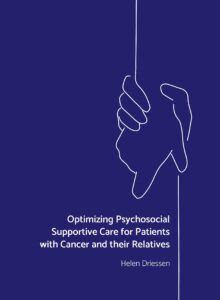PhD Defence Helen Driessen
The diagnosis, treatment, and consequences of cancer can impact patients and their informal caregivers greatly. They are confronted with complex care provided by various healthcare professionals. At the same time, tasks and relationships at home and work change. These fluctuating cancer-related challenges can result in unmet care needs. Supportive care is important for patients with cancer and their informal caregivers to deal with these (unmet) needs. In this stressful situation, some patients and their relatives struggle to find appropriate supportive care. Next to this, the disease also has an impact on the healthcare system. The demand for and costs of the healthcare system are on the rise, and simultaneously, there are fewer resources available to address the needs of patients with cancer.
Thus, it is crucial to develop a strategic approach to provide appropriate, personalized, and adequate supportive care in order to address the psychosocial and informational needs of patients and their informal caregivers, while taking into account the costs of and demand for care in the future. As a result, this dissertation adopts a novel perspective by focusing on the role of designated ‘Centers for information and support’ in providing supportive care. Such centers offer multiple types of informal care together with non-medical formal care, complementary to, and in close collaborate with, medical formal care provided by the hospital. The central goal of this dissertation was to optimize supportive care in patients with cancer and their relatives. This central goal is divided into two aims: 1) to gain a better understanding in the services of centers for information and support, the needs of patients with (advanced) cancer and their relatives, and the match between the centers’ services and the needs of patients and their relatives (part I), and 2) to optimize supportive care via the formal care route (part II).
